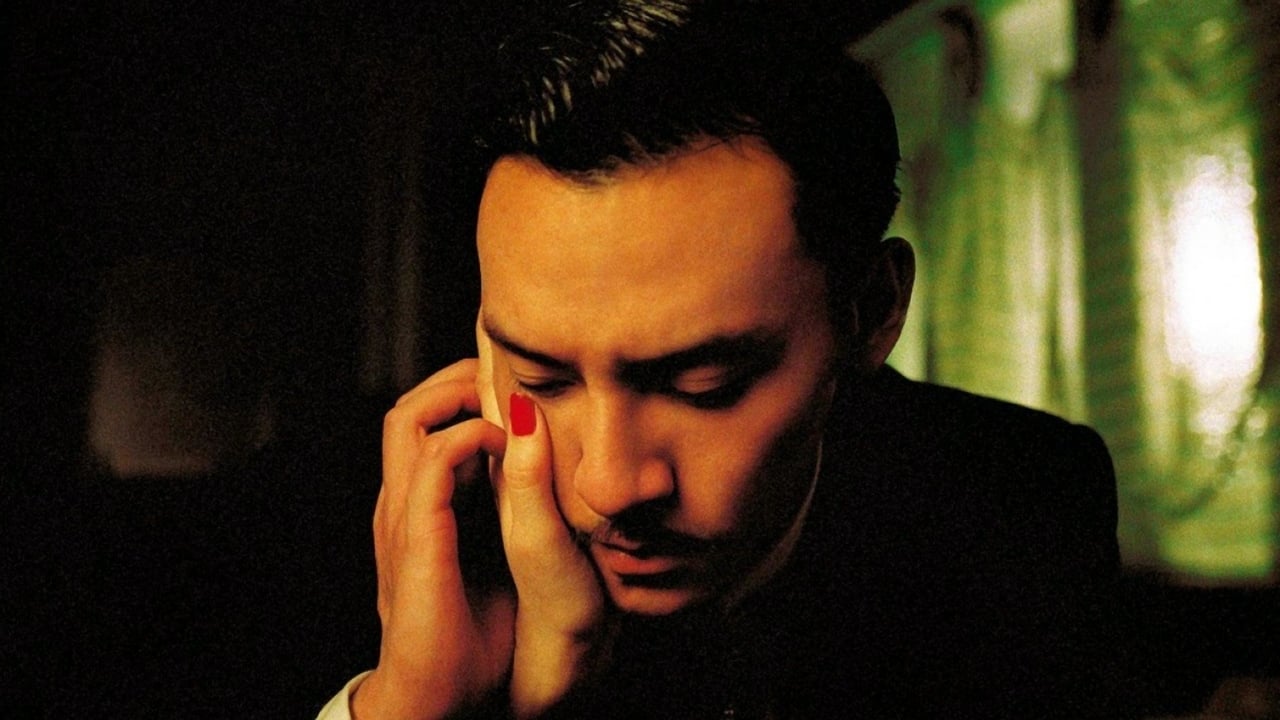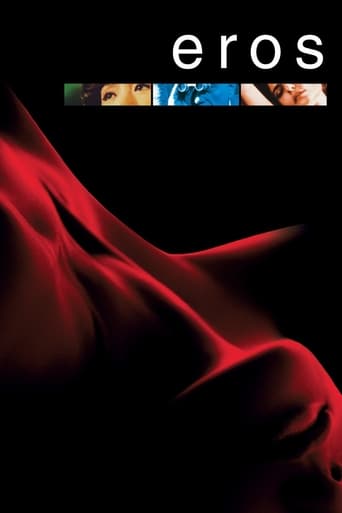Diagonaldi
Very well executed
Inclubabu
Plot so thin, it passes unnoticed.
Sexylocher
Masterful Movie
Smartorhypo
Highly Overrated But Still Good
tieman64
"Where is the thread now? Off again! The old trick! Only I discern the infinite passion, and the pain, of finite hearts that yearn." – Robert Browning"There are no sexual relations." – Jacques Lacan "Paint not the thing, but the effect it produces." - Mallarmé "Eros" is comprised of three short films, one by director Wong Kar-Wai, one by director Steven Soderbergh and one by Michelangelo Antonioni. The topic of each film is "love", Wong's film a melodrama about a tailor's infatuation with a woman whose dresses he makes and Soderbergh's involving a zany discussion between an advertising executive and a psychotherapist. The meta-story here, though, is of Soderbergh and Wong's love for Antonioni, whom both cite as an influence and inspiration.Unsurprisingly, Antonioni's contribution to "Eros", "The Dangerous Thread of Things", is the most interesting film of the bunch. Shunning the melodrama of Wong Kar-Wai and the nervous tics of Soderbergh, Antonioni instead adopts a more metaphysical tone. The result is a film which has a lingering, haunting sought of impact.As with many of Antonioni's films, "The Dangerous Thread of Things" is less a love story than an "end of love" story. Our main characters, Christopher and Chloe, are ex lovers whose relationship is coming to an end. The film opens with Chris oblivious to Chloe's posed, naked body. They then spend their day bickering and reminiscing about better times, both simultaneously wishing to be free of the other and yearning for a time when things were right between them. Christopher's solution to their problems is to have immediate sex. "Sex is more than you think it is," Chloe sighs.Midway in the film our couple spy several nymphs frolicking beneath a waterfall, and later see a beautiful woman riding on a horse. Chris pursues this woman, following her to a castle whose walls recall the rocky outcroppings amongst which the nymphs played. Chris enters this castle, stepping into cave-like shadows. There he finds the woman. Her name is Linda, Antonioni's representation of a kind of wild, chaotic, independent, but simultaneously idealised, femininity.Cut to Linda masturbating, alone, on a bed. As she climaxes, Antonioni cuts to a shot in which his camera vacates a narrow tunnel to reveal Chris alone on a rooftop next to a metal rooster (literally a cock). The symbolism here is uncustomarily clunky for Antonioni. Moments later Linda and Chris do have sex, however its anticlimactic and the scene ends with Chris literally worshipping at her feet. He's forever entranced, but dares not to pull at her "dangerous threads". To pull, to investigate further, would be to unravel the whole image. Instead he leaves her there, alone in the castle, lost in his mind space.The film ends with Chloe and Chris speaking on the phone. Time and space separate them, but they wish to reconcile. To fix their relationship. Chloe spies some wild horses in the distance and tells Chris that she needs to go retrieve them. Whilst in search of the untamed horses she finds Linda naked on a beach. In an instant, Chloe is also naked. Their shadows come together, though Chloe's shadow, scrawny and flawed, ultimately overshadows Linda's buxom silhouette. Speaking of this moment (30 years before filming it, in one of his notebooks), Antonioni says it is meant to suggest a confrontation between enemies, but also heartache and a friendship. Antonioni holds the image, forces his audience to think about what he's just revealed. Fade to black.Antonioni directed "The Dangerous Thread of Things" when he was 92 years old, crippled, wheelchair bound and had lost the use of his eyes and voice. The director made two masterpieces in his later years, "Michelangelo Eye to Eye" and "Beyond The Clouds", two of his most powerful, formally beautiful films. Unfortunately "The Dangerous Thread of Things" does not reach these heights. Its sound dubbing is terrible, Antonioni's symbolism is clunky, his lighting plain and the film as a whole lacks the moody, dreamy polish of his best works. Notice these are all aesthetic problems, the flaws of a dying artist unable to muster the energy to command the camera and mould his cast. The actual content of the film haunts, and its the only film in "Eros" which actually sticks its claws into you. Even Antonioni's deathbed works posses an invisible power which few directors can replicate.7.5/10 – This review has focused on Antonioni's instalment, but Wong Kar-Wai's short film is also quite good. Revolving around a tailor and the prostitute he is infatuated with, the film suggests that creativity, or specifically the drive for perfection (the sewing of perfect clothes), is driven by the compulsion to cancel desires or to attain the unattainable. Though doomed to failure, humanity forever strives for what is out of reach. Soderbergh's film is the lesser of the three, though fans of actor Robert Downey Junior may find it interesting.Worth two viewings.
gradyharp
The initial concept for making this film was to offer three variations on the theme of love from three directors from three cultures. Or is the title 'Eros' more about the erotic than about love? Question unanswered by this triptych of minor works by some superb directors. The end result seems to be three streams of conscious thoughts looking for a reason to make it to the screen. With the brilliance of the three directors one would expect far more than the film delivers.Wong Kar Wai presents the strongest of the three films in a dark story about a tailor who sublimates his desire for a courtesan (Gong Li) by making clothes for her - a 'servant' who finally reverses his role. The photography and interweaving of the characters is very beautiful to experience.Steven Soderberg makes a testy little script about an ad man (Robert Downey, Jr) in therapy with a bizarre psychiatrist (Alan Arkin) exploring a recurring sensual dream. Shot is black and white the actors give it their all but the story is silly and becomes boring with all the distractions Soderberg works into the weak plot.Antonioni attempts to breathe life into the old Italian movies of lover's spats and diversions and comes up with what feels like a script-less little mess of a movie bent solely on see-through blouses and nude cavorting on beaches.As a triptych the film just doesn't become airborne, despite some very high powered, first rate directors. Much ado about very little. Grady Harp
Mustafa32
One shudders at the disrespect shown here for the master of cinema Antonioni. Clearly one of the five or so greatest directors that has ever lived.His segment is easily the most worthwhile of the three. Wong and Soderbergh provide bland mainstream narratives. Antonioni, whilst not on his 60s form, still sculpts with cinema like no- one else. The acting is stylised, disturbingly so, but not without intention. The composition is gorgeous. The meanings teasingly subtle. There is an indefinable wholesomeness, not a full meal perhaps, but a gorgeous miniature that satisfies the palette and leaves a lingering aftertaste. Yes, there is also some nudity - what are we, five year olds?
scorseseisgod-1
The problem with omnibus films, in which several directors contribute a segment to a common cause, is inevitably one outshines the others and you are forced to make a choice. Here are three of today's most prominent directors given thirty to forty minutes to expound on the linking themes of eroticism and desire. It is difficult to absorb the vision of one artist let alone three cinemasters, especially when two are not performing on all cylinders.The project was initiated by Stephane Tchal Gadjieff, producer of Antonioni's last feature, "Beyond the Clouds." Partially paralyzed from a stroke, the legendary director was still eager to continue making films. Inspired by his devotion, Gadjieff devised a trilogy focusing on the subject of "eros." According to the press notes, "The concept was to have two major young directors, who have been on record to say that they have been influenced by his film-making, accompany him. Each would do a segment on the erotic subject of their choice...Also, we wanted Antonioni to tell us near the end of his life what 'eros' was to him." After considering numerous candidates, Antonioni settled on a pair of diverse talents. His admirers of choice were Wong Kar Wai, Hong Kong's master of mood and unrequited romance ("In the Mood for Love," "Days of Being Wild") and Indie-darling-turned Hollywood-heavyweight Steven Soderbergh ("King of the Hill," "Ocean's 12").When assembling a trilogy film, rule of thumb generally centers the weaker of the three passages while saving the best for last. "Equilibrium" received proper placement. In terms of everything from concept to execution, Soderbergh's segment is far outclassed by his colleagues'. With a patient's back to him, how does a bored shrink pass the fifty minutes? The director took great delight in building a tale of eroticism around Alan Arkin and Robert Downey, Jr., but the yuk stops there. Arkin is very amusing as the scoptophiliac psychiatrist who sneaks peeps in-between Downey's catharses, but it's a one-joke concept that at 27 minutes goes on far too long. Animation guru Tex Avery's paranoid masterpiece "S-h-h-h-h!" made better use of similar material, plus adding a mood paranoia, at one-seventh the length.Although built around him, for the sake of structure and pacing, the film should have opened with Anotonioni's segment. Co-scripted by lifelong collaborator Tonino Guerra ("L'Avventura," "Blowup"), "The Dangerous Thread of Things" has been described as a "mental adventure." Carlo di Carlo, curator of Italy's Antonioni museum, says, "Antonioni wonders: is a film born first in response to an intimate need of its author or are the images destined to have a value - ontologically - for what they are?" A brilliant notion (would one expect anything less of the director?), but given the allotted time, were it not for Mr. Carlo's guidance, I never would have been aware of this concept.An American and his Italian wife are so bored with each other that they barely notice the beauty of Antonioni's surrounding landscapes. He doesn't seem to care that she strolls through town in see-through attire. A beautiful young girl enters the picture, the plot vanishes and we spend the rest of the time focusing on textures both man-made and of the flesh.Wong Kar Wai's opening salvo is so powerful that it dwarfs everything that follows. Inspired by the SARS epidemic, the director fashioned his segment around "the act of 'touch.'" Once again Kar Wai's scorching, rain-soaked summers are painstakingly brought to life through cinematographer Christopher Doyle's unforgettable lensing. Chang Chen plays a nervous tailor's apprentice sent on his first solo fitting. Miss Hua (Gong Li) is a legendary concubine who strips the boy down, gives him hand release and instructs, "Remember this feeling and you'll make beautiful clothes." Years pass and even after countless fittings, the subject of their first encounter is never breached. The shame of listening to Miss Hua's sexual encounters each time he waits for their appointment only adds to his excitement. When sick and sponsor-less, she finally mentions the unmentionable, but her body is no good anymore. "All that's left is this pair of hands. You don't mind, do you?" When it comes to suppressing emotion and establishing mood through style, no one at work today can top Wong Kar Wai.Anyone who saw "In the Mood for Love" knows that these characters don't stand a chance at happiness, but plot is not the point. This is a film where style is not only subject, but substance as well. What he shows you is never as important as how he shows it. His approach is pure cinema, transcending and redeeming even the slightest of stories with the lens of his camera."The Hand" - ********* "Equilibrium" - ** "The Dangerous Thread of Things" - ******

